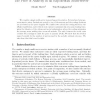Free Online Productivity Tools
i2Speak
i2Symbol
i2OCR
iTex2Img
iWeb2Print
iWeb2Shot
i2Type
iPdf2Split
iPdf2Merge
i2Bopomofo
i2Arabic
i2Style
i2Image
i2PDF
iLatex2Rtf
Sci2ools
ORL
2007
2007
The price of anarchy in an exponential multi-server
We consider a single multi-server memoryless service station. Servers have heterogeneous service rates. Arrivals are routed to one of the servers, and the routing decisions are not based on the queue lengths. We consider two criteria for routing selection: the (Nash) equilibrium, under which each customer minimizes his own mean waiting time, given the behavior of the others; and social optimization, where the routing minimizes the average mean waiting time across all arrivals. The ratio between the social costs of these two routings is called the price of anarchy (PoA). We show that the PoA is upper bounded by the number of servers used in the socially optimal outcome. We also show that this bound is tight.
| Added | 27 Dec 2010 |
| Updated | 27 Dec 2010 |
| Type | Journal |
| Year | 2007 |
| Where | ORL |
| Authors | Moshe Haviv, Tim Roughgarden |
Comments (0)

